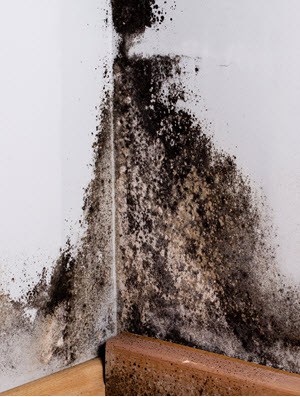Floor Not Bone Dry? Slab Testing and Mitigation
Concrete Floor Systems provides complete moisture mitigation services for our clients.
RH Testing of the Concrete Moisture
The first step in moisture mitigation is to test the moisture content of your concrete slab. For polished concrete, this is performed using RH Testing (RH stands for relative humidity).
We use probes that measure the relative humidity and calculate the moisture within the slab. Whether or not your slab passes depends on the humidity within the slab as well as what type of coating or application will be used on top of the flooring.
Note that in the past some concrete contractors would try to identify excessive moisture using a calcium chloride test. Unfortunately, the efficacy of this method of testing is somewhat suspect as it only measures the moisture of the concrete surface as opposed to the internal moisture of concrete floor slabs.
The probes that we use are much more effective at determining whether or not you have a moisture issue in your concrete slab.
If Your Floor Passes the Concrete Moisture Test
If your flooring slab is designated as dry, congratulations! You don’t have a moisture problem. We’ll let you know the results and that you’re clear to proceed with your project.
If Your Floor Fails the Concrete Moisture Test (Don’t Worry)
Excess moisture in your concrete slab must be addressed. We will guide you through the process, but you have two options depending on your requirements:
Option 1: Vapor Retarder
One of the products we recommend and install for moisture mitigation is a vapor retarder (or vapor barrier) on top of the concrete floor. The vapor barrier is an essential component of the moisture mitigation system that will prevent any moisture within the slab from having any negative impact on what you overlay on top of the slab.
Option: 2 Moisture Mitigation Coating
To further aid moisture control, we will coat the slab or flooring with a chemical coating that prevents moisture from emerging from the surface of the floor or cement. This will also prevent any moisture vapor emission from damaging whatever you apply to the top of the floor and help keep it dry.
Why is Moisture Mitigation Necessary Anyway?
Obviously, water is an essential ingredient in the creation of concrete floors. As the wet concrete mix is poured and formed into a slab, the water vapor that is within the slab migrates to the surface of the slab as it is drying.
Moisture transmission occurs as the water (in the form of vapor) moves from an area of higher relative humidity (the slab) to an area of lower relative humidity (the surrounding air).
Before applying a coating or covering to new concrete flooring, you must be sure that the floor meets the relative humidity requirements for that particular application.

If there is too much moisture contained within the slab, the following problems can occur:
- Mold – a wet concrete floor can seep up into anything that comes in contact with the concrete – including carpets, walls, and moulding. The result can be mold growing on all of these surfaces.
- Warping / Buckling / Cracking – Wood floors placed on top of the concrete slap can be adversely affected by the moisture and can raise and warp – resulting in a flooring failure that ruins the wood floor. Tile floors can be affected in a similar way. As the moisture makes its way to the surface of the slab, it can cause the tile to bend and crack.
- Whitening (Efflorescence) – if you apply a stain that has a high concentration of copper salts to a wet concrete floor, the result can be a whitening of the concrete floor.
- Bubbling / Blistering – High slab moisture content causes pressure from the rising water vapor. This pressure can result in bubbling and blistering of coatings that are applied to the concrete floor.
FloorMedics – Our Moisture Mitigation Partner
Floor Medics is the first testing agency in Colorado in this segment and is one of very few in the USA that solely focuses on certified concrete moisture reporting and moisture related floor covering failures.

Moisture Testing Partner
Floor Medics uses state of the art technology in providing accurate and ASTM compliant in-situ concrete slab relative humidity and temperatures. The result is valuable tracking data of both temperature and moisture trends in a slab.
Ryan Fortune is a Certified Moisture Technician with the International Concrete Repair Institute. Ryan is also an active voting member on the ASTM F6.40 committee that creates the standards for F710, F2170, F1869, F2659 & F3010.
Clients that have been used FloorMedics include:
- Cushman & Wakefield
- Lincoln Property Company
- Nordstrom, Inc.
- Simon Property Group, Inc. (American commercial real estate company, ranked #1 in the United States as the largest real estate investment trust.)
- Cushman & Wakefield
- Flatiron Property Management
- Brinkman Properties
- American Renal Associates, LLC
- Aviva Properties
- Coughlin & Company